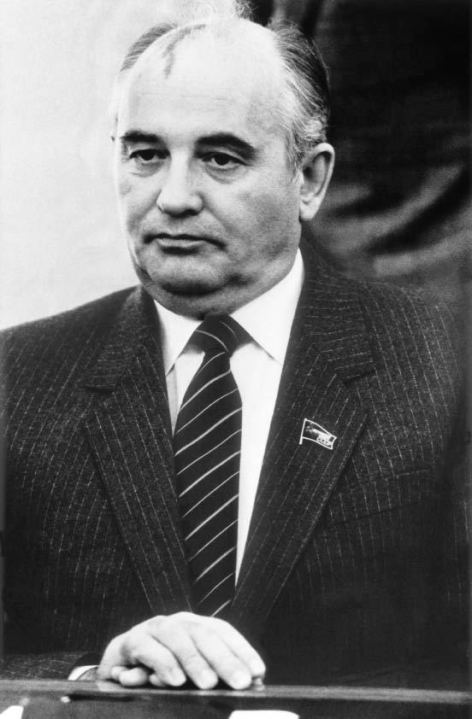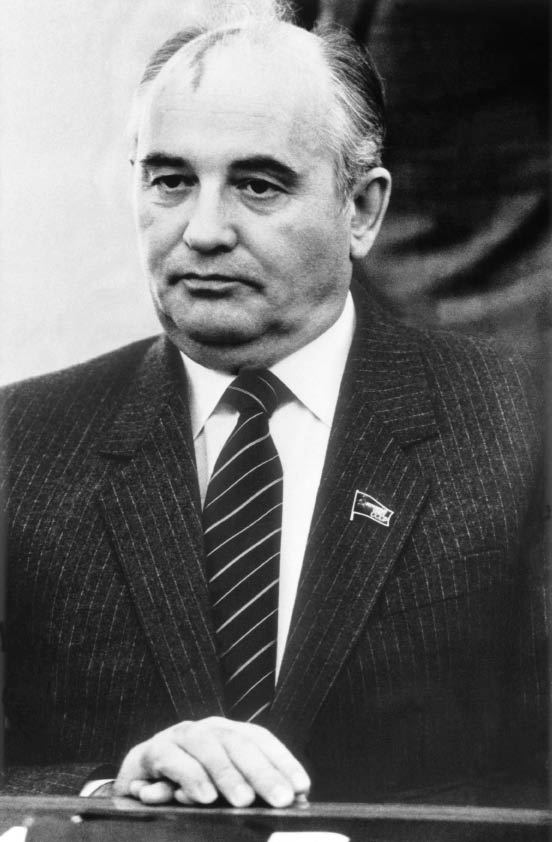The international stage is dominated by two men this March: Muammar Gaddafi, fighting like mad for the survival of his regime, and Mikhail Gorbachev, celebrated around the world on his 80th birthday for not being a Gaddafi. Nobody knows what will now happen in Libya; but the Gorbachev celebrations will culminate next week in a splendid gala at Royal Albert Hall, with a crowd of celebrities and tickets on sale for up to £100,000.
Some 20 years ago the communist dictators faced the same choice as the Arab dictators today: to surrender their regimes or to massacre their people. Some chose massacre, like the Chinese comrades, who slaughtered thousands of protestors at Tiananmen Square in 1989. But Gorbachev rejected such methods, and so the Soviet Union collapsed almost peacefully. This is how he became a hero.
Tiananmen
Yet, as secret archives now reveal, the truth was not so simple. Thus, notes taken at Politburo meeting on 4 October 1989 read:
Lukyanov reports that the real number of casualties in Tiananmen Square was 3,000.
Gorbachev: We must be realists. They, like us, have to defend themselves. Three thousand … So what?
Of course, the Soviet massacres in Gorbachev’s time never approached the scale of Tiananmen. The Soviet collapse was that of an empire rather than just a regime, and the outposts were more rebellious than the centre — so that was where the most blood was shed. There were several smaller massacres rather than one big one; and in most cases, Gorbachev’s personal complicity has not been demonstrated.
On 9 April 1989, the Soviet special forces dispersed a peaceful demonstration in Georgia, slashing protestors with spades, killing 20 people and injuring hundreds. Later, Gorbachev denied he gave the orders; but he is on record as defending the massacre at the time.
The transcript of his meeting with the leaders of West German Social Democrats on 11 April 1989 reads as follows:
Gorbachev: There are destructive elements, extremists and even anti-Soviet groups trying to abuse the Glasnost and democratisation for their anti-socialist purposes. But we shall stand up for our interests, for the interests of socialism and the people. We shall defend ourselves. You have heard about the events in Georgia. A rally of notorious anti-Soviets, led by one Gamsakhurdia, was organised there. They abuse the democratic process, heat up tensions, raise provocative slogans, even demand to send Nato forces to the republic. So we have to show them their place, confront these political adventurers decisively, defend the Perestroika — our revolution.
Worse was ‘Black January’ 1990 in Azerbaijan, where Gorbachev introduced martial law and ordered Soviet troops to bring the republic back under control. More than 120 anticommunist protestors were killed and another 700 or so injured. Later, Gorbachev acknowledged his decision was a ‘mistake’, but Azerbaijan’s government has officially labelled it an act of aggression and has not abandoned the idea of putting Gorbachev on trial.
In January 1991, it was the same story in Lithuania: Soviet troops, sent by Gorbachev, fired on the crowd, killing 15 protestors and wounding hundreds. Gorbachev remained silent for about a week, then denied he was responsible and blamed the military.
To Georgians, Azeris or Lithuanians, however, a mere statement of denial is not good enough. Proportionate to the tiny populations of these states, the deaths of a few hundred could be said to have been a huge massacre. In these countries, Gorbachev is seen as a suspect who has yet to clear his name.
Gaddafi
Gorbachev had a direct association with Arab dictators such as Gaddafi, moreover. They fought in the same Cold War. As Gorbachev came to power, Gaddafi fell foul of the West over the 1986 Berlin discotheque bombing, which killed three and injured 230, and was traced to the Libyan embassy. President Reagan retaliated with airstrikes on Libya, which Gorbachev condemned as an act of aggression. He received the Libyan foreign minister in Moscow, cancelled the Soviet foreign minister’s visit to Washington, and protested Gaddafi’s innocence for him.
The documents, however, make it clear that Gorbachev knew perfectly well where the truth lay. The day before the airstrikes began, 14 April 1986, his aide Anatoly Chernyaev wrote in a memo:
Hardly anybody in the world has any doubt that [Gaddafi] is behind the West Berlin explosion and other such things. Is it not the time to tell him frankly that we cannot agree with such actions?
The notes from the Politburo meeting on 29 May 1986 read:
Gorbachev: Gaddafi went so far in his games that he provoked the United States into attacking him seriously. And then he panicked, although we defended him verbally.
Soviets and Libyans worked together to draw lessons from the military experience, and Gorbachev later shared that analysis with Syrian comrades. The transcript reads:
Gorbachev: …as the Libyans began to act more decisively, they managed to shoot five to seven US planes and mounted an effective resistance to the Americans. And the Americans, as we know, are very sensitive to losses. Remember, after several marines were killed in Lebanon, the Congress withdrew the US troops from there. Before their raid on Libya, the Americans did a lot of preparation in order to avoid casualties, using their widespread espionage network. The Libyans made the same mistake which you [Syrians] once made: they used their entire air defence system against the unmanned spy planes. As a result, the Americans learnt the combat frequencies of the Libyan air defence systems.
Assad
The then Syrian dictator Hafez Assad was also in trouble with the West over his support for terrorism. However, in his April 1987 conversation with Assad, Gorbachev blamed the West for the confrontation:
Gorbachev: The West has attacked Libya, and then Syria, i.e. the two countries which are most consistent in their opposition to the imperialist dictates. Gaddafi is our friend, we support him, even though there are frequent reversals in his policies. However, the most important thing is Libya’s and Syria’s irreconcilable attitude to American imperialism.
The document also indicates that Gorbachev was prepared to back Assad in his bid for leadership of the Arab world:
Gorbachev: The Soviet Union, given its capabilities, is also prepared to contribute to the unification of the Arab ranks. Of course, our enemies won’t miss the opportunity to present our efforts as ‘Moscow plotting’, so we should act precisely and with care. In any case, you can count on our support. […] There are many rivals for leadership of the Arab world today. But it is Syria which, because of its strategical circumstances, can and should undertake the responsibility to unite the Arabs. Given the Syrian leadership’s way of thinking, your flexibility and political nous, you can do that.
Transcripts of Gorbachev-Assad talks suggest a remarkable affection between the leaders, who complained to each other of the strains the ‘struggle against imperialism and Zionism’ put on them. In 1988, Assad secretly came to Moscow for medical treatment, and Gorbachev visited him in hospital:
Gorbachev: As soon as I learned about your visit, I instructed E.I. Chazov [the health minister] to make sure the doctors do everything possible for President Assad — our friend, brother and comrade. I would like you to remember there are Moscow, Kremlin, CPSU Central Committee, your friends in the Soviet leadership who are always ready to help you under any circumstances. You can be sure that we shall never let any harm come to friendly Syria. We shall always think together, act together, constantly keep in touch. Are you satisfied with our ambassador in Damascus?
Assad: Yes, he is a good, highly moral man, a man of honour. […] I have instructed all our ministries and the Party leadership to keep in touch with the Soviet ambassador, to share information with him.
Arafat
Another document records the meeting between Gorbachev and the PLO leader Yasser Arafat in April 1988, at the beginning of the First Intifada. Although Gorbachev tried to discourage Arafat from using weapons, he accepted the throwing of stones and Molotov cocktails and said that he had no misgivings about the PLO ‘tactics of using different forms of struggle’:
Gorbachev: I think you have chosen the correct form of struggle. It is essentially a democratic form. It is very difficult to fight against it. The US and Israel are waiting for you to use weapons. They will be pushing you to do that. […] But you must hold on.
Arafat: […] We hold our nerve.
Saddam Hussein
Later, Gorbachev took the western side against one of his Red Arab clients — Saddam Hussein — in the first Gulf war. Yet the documents show his loyalty to western allies to be less than absolute. A memo from his advisers Anatoly Chernyaev and Yevgeny Primakov, dated 23 October 1990, reads:
It would be expedient to share the data we have about Iraq’s military preparations with the US government, in strictest confidence. The data includes information about Iraq’s preparedness to use chemical and bacteriological weapons in case of a military attack against it.
Chernyaev’s handwritten note on the margins states that Gorbachev disagreed.
In her talks with Gorbachev the next month, Margaret Thatcher raised the issue:
Thatcher: Of course, [the military action] is an equation with many unknowns. One is whether Iraq will use chemical and biological weapons, which we know it has. As for nuclear weapons, I believe Iraq still doesn’t have any.
Gorbachev: We have no information to suggest that Iraq has nuclear or biological weapons. It does have chemical weapons.
In fact, Iraq did have biological weapons at the time. Furthermore, Gorbachev apparently knew that Saddam had plans to use such weapons in some circumstances.
So, as we laud some former dictators for being less bloody than others, we should remember that they still did things the worst western politicians would never contemplate. True, Gorby is no Gaddafi; he is not mad. His place is not in an asylum; but nor it is in Royal Albert Hall. His place is in a courtroom — where perhaps he would be able to clear his name. Until then, people should think twice about celebrating him.
Pavel Stroilov is a Russian historian. His Behind the Desert Storm is out this summer







Comments